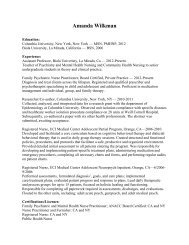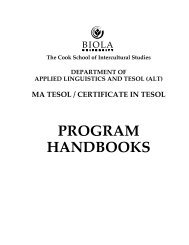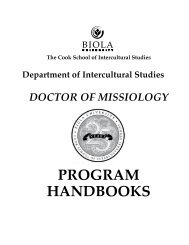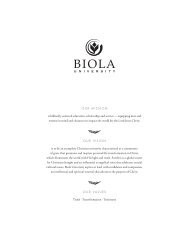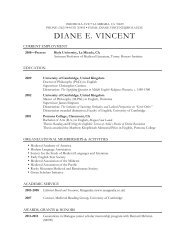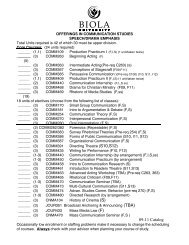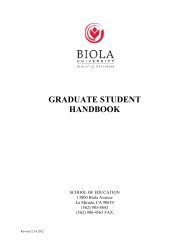Dawkins' God Delusion Divorced American ... - Biola University
Dawkins' God Delusion Divorced American ... - Biola University
Dawkins' God Delusion Divorced American ... - Biola University
Create successful ePaper yourself
Turn your PDF publications into a flip-book with our unique Google optimized e-Paper software.
Proverbs 22:6 — A Promise to Parents?<br />
Train up a child in the way he should go, even when<br />
he is old he will not depart from it. (NASB)<br />
P<br />
arenting is not an easy task. But Proverbs<br />
22:6 is an easy verse from which to find<br />
hope that our children will turn out OK<br />
if we train them well. It’s often misquoted<br />
as a command with a promise: “If we<br />
train our kids correctly in the Lord, then, when<br />
they are older, we can be confident that they will<br />
walk with the Lord, no matter what happens in<br />
the volatile teenage or young adult years.”<br />
The verse has been used by some to heap<br />
guilt upon parents whose adult children are not<br />
walking with Christ, suggesting that the<br />
parents did not work hard enough to “train up”<br />
their children. It also has been used by wellmeaning<br />
folk to provide hope that ungodly<br />
children will return to a godly lifestyle at some<br />
point in their lives. However, both of these<br />
usages are incorrect and can cause great<br />
discouragement. The passage does, in fact,<br />
express hope, but no promise.<br />
Proverbs 22:6 is a “proverb” — no more,<br />
and no less. OK, maybe a bit more, as it is an<br />
inspired proverb contained within the Holy<br />
Scriptures. But, in understanding Scripture,<br />
one must take into account many things, such as<br />
the context, author, historical setting and<br />
literary genre.<br />
The Bible features many literary genres,<br />
including narrative (like Genesis), poetry (like<br />
Psalms and Song of Solomon), wisdom<br />
literature (like Job, Proverbs and Ecclesiastes)<br />
prophecy (the major and minor prophets),<br />
apocalyptic (like Revelation), parables (Jesus’<br />
parables within the gospels) and epistles (the<br />
New Testament letters). Each genre serves<br />
different purposes, which the reader must keep<br />
in mind to correctly understand it.<br />
In the case of Proverbs, one needs to<br />
understand the genre of “wisdom literature”<br />
and, more specifically, the “proverb.” The<br />
wisdom literature of the Bible contains wise<br />
sayings, poetry and teachings that give<br />
guidelines for people to follow. The book of<br />
Proverbs is a collection of pithy, wise sayings<br />
that harbor general truths, but not necessarily<br />
BIOLA CONNECTIONS ❁ SPRING ’07 IN CONTEXT<br />
39<br />
promises. A proverb is brief and poetic to be<br />
memorable, enabling it to be handed down from<br />
generation to generation, providing a form of<br />
wise and moral grounding.<br />
An example of a popular proverb that is<br />
not from the Bible and that we use today is, “An<br />
apple a day keeps the doctor away.” Of course,<br />
when we repeat this proverb we don’t actually<br />
believe that eating an apple every day<br />
guarantees excellent health. But we do believe<br />
that, in general, healthy eating contributes to<br />
physical health.<br />
In the same way, biblical proverbs contain<br />
general truths, but not promises. The general<br />
truth contained in Proverbs 22:6 says that if a<br />
parent works hard to train his or her children to<br />
live a godly lifestyle, then it is likely that the<br />
children will continue to walk in those ways<br />
throughout their lives. The phrase to “train up a<br />
child in the way he should go,” contextually, in<br />
the proverbial genre, means that parents need to<br />
be dedicated to teaching their children to live<br />
moral and godly lives.<br />
Training involves more than instruction —<br />
it also includes living out our lives in front of<br />
our children, modeling godly morals. It<br />
includes giving children practice and<br />
correction to help them learn the godly<br />
lifestyle. It requires dedication on the part of<br />
parents. In fact, the whole focus of this proverb<br />
is on the parent, not the child.<br />
It’s generally true that a child raised by godly<br />
parents to live a godly lifestyle will continue to<br />
live out this lifestyle. I believe that many<br />
students at <strong>Biola</strong> are here because they have<br />
been trained well by godly parents. But it is not a<br />
guarantee. There are many children who have<br />
been raised well by godly parents who have<br />
bought into the ways of the world and no longer<br />
follow Christ. Proverbs speaks to this as well. But<br />
this specific proverb challenges parents to raise<br />
their children well and offers hope that the<br />
probable outcome will be glorious.<br />
James W. Mohler<br />
(’79, M.A. ’84, Ph.D. ’99) serves as an<br />
associate professor of biblical studies in<br />
<strong>Biola</strong>’s seminary, Talbot School of<br />
Theology. He joined Talbot’s faculty last fall, coming<br />
from Trinity College in Deerfield, Ill. His doctorate is<br />
in Christian education.



